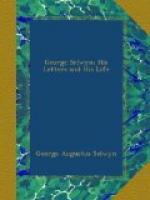(63) George Hobart, third Earl of Buckinghamshire (1732-1804). He was returned to Parliament in 1761, 1768, and 1774, and he was manager of the Opera for a time. In 1762 he was made Secretary to the Embassy at St. Petersburg, where his half-brother John, second Earl of Buckinghamshire, was Ambassador; in 1793 he succeeded him. He married, in 1757, Albinia, eldest daughter of Lord Vere Bertie.
(64) The Count de Viry, Sardinian Minister to England.
(65) William Robert, Marquis of Kildare (1748-1805). He succeeded as third Duke of Leinster in 1773.
(66) Percy Windham O’Brien, Baron of Stricheh and Earl of Thomond, brother of Lord Egremont and of Mrs. George Grenville. He was a Member of Parliament for Mmehead, Lord-Lieutenant of the county of Somerset, and a member of the Privy Council.
(67) George Grenville (1712-1770). Prime Minister and Chancellor of the Exchequer in 1763. The author of the Stamp Act. See his Character, Lecky, “History of England,” vol. III. p. 64.
(68) A dancing girl of fifteen and her family, at the moment the object of Lord March’s attention.
(69) Lady Elizabeth Seymour, Duchess of Northumberland, generally called Lady Betty. In 1740 she married Sir Hugh Smithson, against the will of her grandfather, the Duke of Somerset, who disliked this marriage for the heiress of the Percys, but there was no power of depriving her of the property, and Smithson succeeded to the title in 1750; from this time they both figured prominently in society and politics, and the Duchess’s entertainments, where the best musicians performed, were famous.
(70) William Beckford (1709-1770). Alderman and Lord Mayor of London, and Member of Parliament for the City of London. The friend and supporter of Wilkes, he was an upholder of popular rights at a time when men of wealth were usually supporters of the King.
(71) John George Montagu, fourth Earl of Sandwich (1718-1792); was a party politician whose term of office as First Lord of the Admiralty brought him into general opprobrium; in private life he was even more severely condemned. With the Earl of March, Sir Francis Dashwood, and others, he was associated with Wilkes in the infamous brotherhood of Medmenham, and later, when they made public the secrets of the club against Wilkes, popular feeling rose high against Sandwich, and he was characterised as Jemmy Twitcher, from a play then running; the theatre rose to the words “That Jemmy Twitcher should peach me I own surprised me.”
(72) Sir George, afterward Lord Macartney (1737-1800). An ambitious young Irishman; a tutor and friend of Charles James Fox, he had been assisted in his career by Lord Holland. In 1764 he had been appointed Envoy Extraordinary to Russia, and later held appointments as Secretary to the Lord-Lieutenant of Ireland, President of Madras, Governor of the Cape of Good Hope, and Ambassador to China. He married Lord Bute’s second and favourite daughter, Lady Jane.




